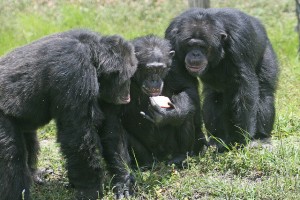Humans have developed the amazing capability to learn new languages, dialects, accents and become multilingual. However, have you ever heard of animals learning new languages? In a recent study, led by Dr. Katie Slocombe from the University of York, nine chimpanzees from the Beekse Bergen Safari Park, in the Netherlands, had been relocated to Scotland’s Edinburgh Zoo. Interestingly, each group of chimpanzees had their own distinctive grunts to represent different types of foods. The Dutch chimpanzees loved apples and had originally called for apples using a high-pitched yell. Whereas the Scottish chimpanzees were less enthusiastic about apples compared to the Dutch chimps and had used a lower-pitched grunt.

Another young chimpanzee on the tree by Tambako The Jaguar on Flickr. Licensed under CC BY-ND 2.0
After a year into the study, the two groups of chimpanzees were still observed to have two distinct calls for apples. Moreover, the social interactions between the groups were very minimal. However, after three years of integration, the Dutch chimpanzees had learned and adopted the lower-pitched grunts the Scottish chimps had used to call for apples. As well, it was noted that the social interactions between the Dutch and Scottish chimps had increased dramatically. Although, the Dutch chimps had adopted the new call, their preference for apples had remained unchanged.
Dutch chimpanzees adopt Scottish grunt for apples. YouTube video courtesy of New Scientist.
This is an interesting study as it was initially thought that one unique characteristic of the human language is the ability to represent the same events and objects using different words across different cultural languages. However, from this study it indicates that that characteristic may have evolved from one of our earlier ancestors, the primates. In addition, although the study did not discuss in detail the initial transition of the two groups during integration, I found it quite astonishing that the two groups did not kill one another as chimpanzees are known to be quite aggressive and territorial animals. Therefore from this study, we see a much softer and gentler side of the interaction between two different clans of chimpanzees which is quite surprising.

“Whatcha got there?” by Matthew Hoelscher on Flickr. Licensed under CC BY-SA 2.0.
Although it is quite difficult to determine the exact reason for the observed change, Dr. Slocombe thinks it could be due to the goal of communicating better with one another or for social reasons. She believes that it is similar to humans as humans who speak the same language or have the same accent tend to get along better with one another. Nonetheless, this study still portrays a great example of animals learning new languages.
– Candace Chang

2 responses to “Bilingual Chimpanzees”